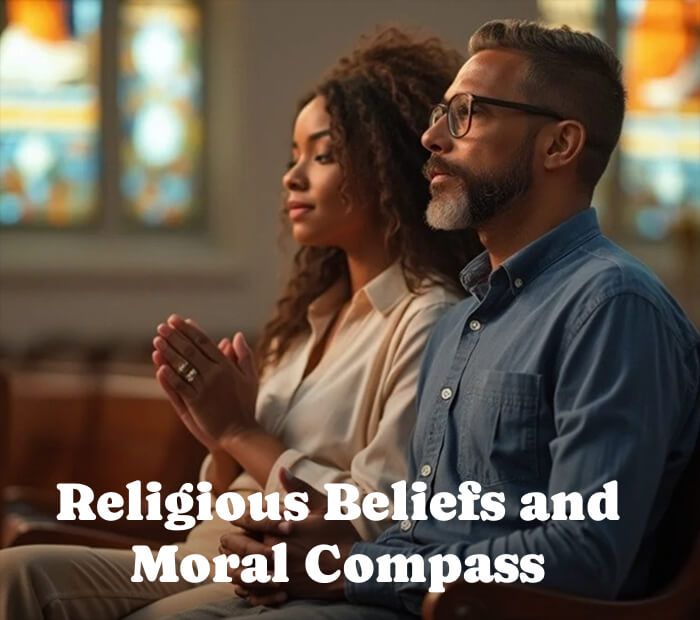A wedding is one of the most important and of course, most beautiful milestones in one’s life. Two people come together to start a life of their dreams, of their love, of their commitment. Of course, every individual wishes to celebrate their big day in a unique way. But truth be told, a wedding is not just about celebrating the big day. It is, in fact, about the life that unfolds afterward. A life full of joy and happiness, but also with hardships to face and fight together. While love lays the foundation of marriage, shared values strengthen and sustain it over time. Knowing those values prior to saying ‘I DO’ can help you build a lasting partnership. In this post, we will shed light on the 7 core values every couple must agree on before their wedding. So, without any further ado, let’s get started…
Table of Contents
What are Values?
Why is it Crucial for Couples to Have Their Values Aligned?
7 Key Values a Couple Must Agree on Before They Say ‘I DO’
Tips to Know if Your Partner Shares the Same Core Values
The Bottom Line
FAQs
- How to know if the person shares the same core values?
- Are core values and preferences the same?
- Why is it crucial to agree on core values before the wedding?
- How to Discuss Core Values Before Marriage
- Do values remain the same all our lives?
What are Values?
Values are the core beliefs, principles, and standards that guide a couple’s decisions, actions and behavior in all. Core values represent what they think is important, meaningful, and worthwhile. Couples can build a strong bond and sustain it for a long time if their core values align. When partners align on core values, they create a harmonious relationship for themselves, their families and for the society as a whole. Having core values in place is crucial to have a strong bond and face hardships with ease.
Before we delve into the key values required for sustaining a relationship, let’s first understand why value alignment is vital for couples. Here we go…
Why is it Crucial for Couples to Have Their Values Aligned?
A wedding is not just about celebrating the day in grandeur, but it is about building a healthy and long-lasting relationship. Undoubtedly, a good value system of partners can make the foundation of any relationship stronger and firmer. Shared values form the backbone of a healthy and long-lasting relationship. There is no denying that love, attraction and chemistry bring two people together, but what keeps the relationships intact forever is their core values. It determines how well they will gel and grow together in harmony. Here are why value alignment matters; take a look…
- Stronger Foundation for a Relationship: Couples who share values often find it easier to build their relationship on a stronger foundation.
- Decision-Making Made Easier: With shared values, making important life choices as couples becomes easier for them. Whether it’s about finances, career priorities, lifestyle or raising children, having aligned values make things easier and comfortable for both partners. They make better decisions with minimal conflict and ensure both of them are moving in the same direction.
- Help Build Lasting Connections: When couples share values like honesty, love, family, connection, loyalty and so on, they connect on a deeper level. This further strengthens understanding, intimacy and trust between them.
- Reduced Conflicts: The major cause of conflicts between couples is the differences in their values. When both partners share the same values, they experience reduced conflicts and enhanced love and respect for each other. It so happens because shared values minimize clashes and make it easier to resolve conflicts with mutual respect.
- Consistency in Long-Term Goals: Aligned values ensure both partners are working toward similar life goals. This is because the two people with the same values then trust each other more, love to encourage each other, and be there to support each other, which is highly unlikely in a relationship with conflicting value systems.
- Help Build Stronger Relationships: Challenges and hardships are inevitable. We all want a great life without hardships, but that can only happen in stories or books. In reality, there are real challenges even for couples. Challenges like financial problems, career setbacks, family issues, health concerns and so on. Amidst these challenges, like keeps happening. Couples with shared values find it easier to overcome these challenges together. They stay united even in the face of adversities and come out stronger and better.
So, what are the key values that each couple should share or we can put it this way, what are the values that you should look in your partner before actually saying Yes to the proposal?
Read this section for the core values that can help you build strong relationships. Here we go…
7 Key Values a Couple Must Agree on Before They Say ‘I DO’
Before walking down the aisle, couples should take time to reflect on and openly discuss what matters most to them. Here are the 7 most important values that every couple must agree on before their wedding. Take a look…
1. Trust and Honesty

At the heart of every strong marriage lies trust. Without trust, building a strong relationship is next to impossible. And trust can only be built through honesty, transparency and consistent actions over time. Before you say “I do,” it is crucial that you talk about what trust is for you and how you want to have it in your relationship.
For some, honesty may mean being open about every detail, from finances to past experiences. For others, it may mean respecting boundaries while still being transparent about major life decisions. Whatever your definition of trust is, it is crucial that you and your partner-to-be agree that trustworthiness and honesty are unquestionably important in the relationship.
Why is it crucial?
Because trust in a relationship helps couples feel secure and confident at all times. Any relationship with trust at the trust and honesty as a foundation is sure to flourish. It eliminates chances for fear, jealousy or suspicion, allowing couples to be more open with each other and feel safe with each other.
2. Financial Values

There is no denying that money is important for living a happy life. More often than not, marriages fall apart because of financial issues. Yes, money has been a major and most common source of marital conflicts. This makes discussing financial values with your partner to-be more important then ever before you say ‘I Do.’ Make sure to discuss your financial habits, goals and expectations with the person you plan to share your life with.
Ask questions like:
- How do you prioritize money in life?
- Do you save or spend all your money?
- Are you comfortable with debt?
- Will finances be merged or kept separate?
- Are you more of a saver or a spender?”
- Do you like sticking to a budget, or do you indulge in spontaneous spending?
- How will major expenses, like buying a home or raising children, be handled after marriage?
Answers to these questions will allow you to have an understanding about the person’s financial habits. Also, you will know whether their financial values align with yours or not. The person maybe a spender and on the other hand, you may be a saver, see if together you can come up with a budget and financial strategy that suits both of your financial values.
Why is it important?
It is important because it can save you from a lot of hassle that come after marriage when actually financial issues knock the door. There is a saying, “when financial issues hit the door, love flies from the window.” By agreeing on money values early on, you can significantly reduce tension and avoid chaos and misunderstandings. Also, it will allow you the time to work together toward shared dreams, such as travel, investments, or early retirement.
3. Growth & Evolution

Like any other aspect of your life, marriage can also last when growth and progress are embraced by both partners. Understand that marriage is a journey, not a static union. You evolve with time, with challenges, with learning and with new experiences. Commitment to growth can help you two grow and evolve together. Therefore, it is crucial to know whether the person you plan to share your life with is open to growth and evolution. Agreeing on the value of personal and mutual growth simply implies that both partners are willing to learn, adapt and support each other through life’s transitions.
For some, growth could mean pursuing higher education, shifting careers, locating to developed countries and so on. While for others, growth can mean starting a family, exploring spirituality, or working through personal struggles. See if you two share the same values when it comes to growth and progress as married couples.
Why is it imperative?
It is imperative to see whether you two have the same perspective when it comes to growth and evolution, because then only you will be able to flourish together. Couples who commit to growing together not only celebrate each other’s progress but also strengthen their bond when challenges arise. When partners have different goals or expectations, disagreements arise, which further lead to broken families. However, with growth as a shared value, you can overcome any challenges or differences that arise and learn and evolve through them.
Related Post: 20 Delightful Things For Guys To Do Before The Wedding
4. Family and Children

Family and children are another important value that you should discuss before tying the knot. Understand that we all have different expectations when it comes to family and children. Some prefer having kids, while others prefer not having kids and enjoy life together. It is very important that you discuss your choices prior to settling with each other so as to eliminate differences as much as possible.
Not every couple wants the same family structure, and that’s perfectly okay as long as you two are on the same page. Make sure to have an open conversation about whether you want children, how many, and how you plan to raise them. Aside from that, it is crucial to talk about your own family system. In most Asian countries, living with parents is encouraged. It is crucial to discuss your approach to extended family.
Ask:
- How much involvement will parents, siblings, or relatives have in their lives?
- How will holidays and festivals be celebrated?
- Do you like the joint family system or the nuclear one?
- How will cultural or religious traditions be passed on?
- How to essentially make major decisions in the family?
And so on….
Why is it vital?
It is vital to be on the same page in matters of children and family to avoid disagreements and misunderstandings. Agreeing on family values doesn’t mean every detail needs to be resolved before marriage, but it is important to have clarity on certain things before the wedding. Understand that family can lead to both happiness and stress, depending on how aligned a couple is in this area. Hence, it is crucial to check whether you two align on this aspect or not.
5. Communication and Respect

Communication is the key to having a successful relationship. No marriage in the world comes without disagreements, problems, challenges or hardships. In such a situation, communication and respect for each other come for the rescue. These two most important values can help you face life challenges without any stress. Having commitment to healthy communication and trust can save couples from a lot of issues later. Besides other things, these two help you in conflict resolution.
Every individual communicates differently. Some prefer to talk things out immediately, while others need time to process before discussing. Couples should know each other’s styles and agree on respectful ways to navigate disagreements. See if you two prioritize listening, empathy and problem-solving over winning an argument. Know that if you do not share the same values when it comes to communication, then having a respectful relationship is out of question.
Why is it indispensable?
It is indispensable to have shared communication values. Couples who prioritize healthy communication not only build strong bonds, but also avoid destructive behaviours, like name-calling, blaming, extreme aggressiveness and so on. They understand that conflict in marriage is not about one person versus the other. In fact, it is about working together to find a solution that strengthens their relationship and connection.
6. Lifestyle and Life Priorities

Marriage itself is a big milestone, but that’s not just it. With marriage, a lot comes on your plate, including the everyday hustles. And that’s when values around lifestyle, routine and life priorities play a crucial role. When considering someone for a wedding, make sure you two agree on values around lifestyle, routines, and priorities. When we say lifestyle, it includes things that you do in your free time, your hobbies, your social life and how do you wish to have a balance between your work life and home life. Also, it includes the overall wellness of you two as individuals and couples.
Some people prefer spending time in traveling, visiting new places, exploring new scenes, while others prefer more quietude and spending time reading, hobbies, and even daily responsibilities. Of course, you will always find people with different tastes, preferences and lifestyle choices. But with shared values, couples can find a lifestyle balance that works for both.
Why is it crucial?
It is crucial because agreeing upon the same lifestyle values and life priorities can help you build a long-lasting relationship. Aligning with these priorities ensures smoother daily living and reduces friction over time. Hence, it is crucial to know what kind of lifestyle you two envision together and deciding on things that you can do to bring balance into your life.
7. Religious Beliefs and Moral Compass

Last but not least are religious beliefs and a moral compass. For many couples, spirituality, religion or personal belief systems are deeply ingrained values that influence life decisions. While others may not give much of importance to these beliefs. It is crucial to discuss your religious beliefs as well. It is important to know where you two stand and how these beliefs will shape your marriage. Having extreme differences in religious beliefs can bring extreme conditions as well. To avoid that in future, you must always consider having conversations around religious beliefs and family values.
If one partner is religious and the other is not, conversations should cover how traditions will be honored, how children will be raised, and how differences will be respected. Of course, you two don’t have to share identical beliefs, but you must agree on a shared moral compass and mutual respect to have no disagreements in the future.
Why is it vital?
Having conversation around religious beliefs and moral compass is crucial to know if you two can have a balanced relationship even if your belief systems vary. When you and your partner agree on these key principles before your wedding, you will have a firm basis to tackle problems together.
So, these are the values that you two need to agree on prior to the wedding. Let’s now take a look at the tips to know if your partner shares the same core values. Here we go…
Tips to Know if Your Partner Shares the Same Core Values
Here are tips to know whether or not you two are aligned on your value systems. Take a look…
- Have Open Conversations Early: Discussing important topics, including family, career goals, money, faith and lifestyle choices, is crucial to building a strong relationship.
- Observe Lifestyle Choices & Daily Habits: Observe their habits and lifestyle choices whenever you two are together. This will help you know each other better.
- Check Long-Term Vision: It is important to discuss your long-term vision. Know that if your visions complement each other, it’s a strong indicator of shared values.
- Notice Their Reactions to Challenges: See how your partner handles stress, conflicts and challenges. Do they align with your way of approaching problems or do they tend to react even for small things?
- Evaluate How They Communicate: See how your partner talks with you and, of course, with others, especially when angry or upset. Observe if they become disrespectful when angry or remain calm even if things go absolutely topsy turvy.
- See How They Treat Their Juniors, House Helps & Others: Pay attention to how they interact with their juniors, friends, house helps and strangers to check their values in action.
- Listen Beyond Words: Actions speak louder than promises. People may change their words for the time being, but concealing actions and expressions for a long time is not possible. Consistency in behavior over time is the truest reflection of their values.
- Trust Your Gut Feeling: If something feels off despite what they say, pay attention. Intuition often picks up on mismatched values before the mind does.
The Bottom Line
So, there you have it: the 7 core values a couple must agree on before their marriage for a “Happily After.” Know that marriage is just the beginning of a life filled with love, partnership and growth. Undoubtedly, romance and chemistry are crucial, but it is their shared values that keep them strong through life’s challenges. By aligning on these seven core values, couples can ensure a long-lasting relationship even amidst all the adversities. Make sure to discuss core values with your partner very well in advance to eliminate disagreements and build a solid foundation for a happy married life.
FAQs
1. How to know if the person shares the same core values?
Just see if their beliefs, choices and long-term vision align with yours. Talk about your values clearly and ask them of theirs to ensure you two are on the same page. Also, how consistent they are in their words and actions. We have also provided some tips to find if the person shares the same values or not. Just follow them.
2. Are core values and preferences the same?
No, core values and preferences are different. Preferences are an individual’s liking for food, travel, dressing style and others. Preferences do matter but are often flexible and can be compromised. But values are the principles that a person lives by. Values define one’s character and overall lifestyle. Moreover, values can not be compromised. If compromised, they can bring in a lot of trouble in a couple’s life.
3. Why is it crucial to agree on core values before the wedding?
It is important to agree on core values before wedding to create a partnership built to last.
4. How to Discuss Core Values Before Marriage
Conversations about values may seem challenging, but they are not actually. Here are some tips:
- Discuss your values early on: Don’t wait until the wedding is near. Begin these discussions during engagement or even before.
- Be Honest: Share openly about your beliefs, fears, and expectations. Don’t withhold important details.
- Listen Actively: Give your partner space to express themselves without judgment.
- Find Common Ground: Even if you disagree on specifics, look for shared principles that unite you.
5. Do values remain the same all our lives?
Most of the core values do remain, while others may evolve overtime. Continue to check in with each other as your relationship develops.


![110 Heartfelt Engagement Anniversary Quotes [2026] 110 Heartfelt Engagement Anniversary Quotes [2024]](https://www.happywedding.app/blog/wp-content/uploads/2024/02/110-Heartfelt-Engagement-Anniversary-Quotes-2024-300x150.jpg)




